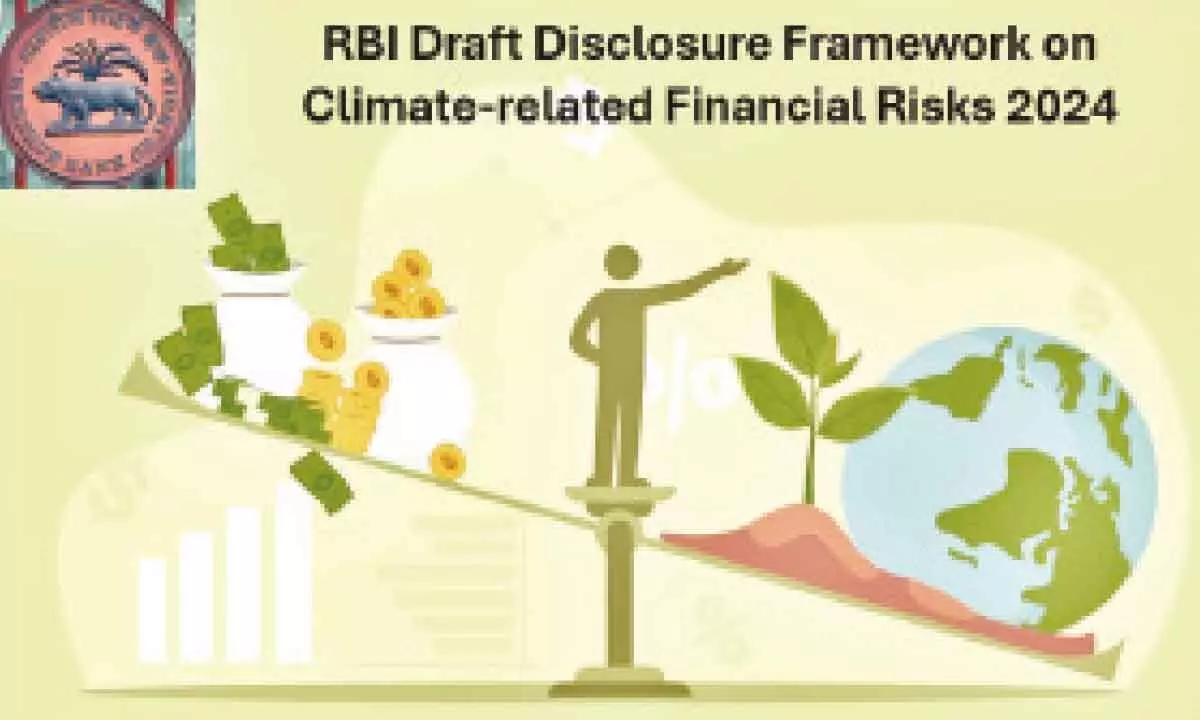Banks need RBI’s effective disclosure framework to survive climate related risks
Climate change will impact the safety and soundness of individual banking institutions
image for illustrative purpose

The board has also to ensure that clear cut strategies are in place along with risk management frameworks to warrant any changes to its compensation policies, and be in line with business and risk strategy, objectives, values and long term interest of the bank
Banks and financial institutions are subject to climate related risks both physical and transition in these times of severe climate change happening globally, including extreme heat waves; weather conditions that are adversely impacting agriculture and food production; water scarcity; excess or scarce rain; floods; cloud bursting; extreme storms; ice melting; sea rise; wild fire destroying forests and deaths.
These events will also adverse impact on micro and macroeconomic factors affecting the soundness of economy, which will necessitate huge money to rebuild infrastructure and ensure economic revival. This grim situation will call for plans towards reducing emissions by focusing on alternative sources of energy like solar, wind and hydrogen, which need substantial investment.
Hence climate change will impact the safety and soundness of individual banking institutions apart from having stability implications for the banking system. It is therefore imperative for banks and financial institutions to have action plans to evaluate climate related risks in the short, medium and long term duration and assess their impact on credit, market, operational risks and in assessing all such aggregated risks on solvency and earnings of respective institution in varying duration so as to have adequate economic and regulatory capital to not only absorb such risks but also build up models and technological tools to evaluate and stress testing on a base scenario, high and extreme scenario to protect the interests of all stakeholders.
The regulator will also have to ably assess climate risks and stress testing results and abilities to foresee, and deftly manage, climate related risks on a sound basis to avoid any systematic level risks to banks and financial institutions. Their financial stability will be necessary for macroeconomic stability.
Such climate related risks analysis and stress testing have to be both bottom up as well as top down exercises. While bottom up exercises may be more resource intensive for banks, they depend upon individual banks. This can be effective in raising awareness of the risk on hand and promoting capacity building in risk management practices and helping banks fill their own data and methodical gaps. This will help supervisors and banks benefit from bottom up exercises even in supervisory exercises. Top down exercises applied homogeneously in a specific jurisdiction may be useful for supervisors to understand transmission channels across institutions and overall aggregated impacts on climate related risks to the banking system. (Basel discussion paper ‘The role of climate scenario analysis in strengthening the management and supervision of climate related financial risks’.)
Climate Scenario analysis is useful to assess the individual banks risk management process and capabilities like 1. bridging important gaps in data and methods; 2. evaluating potential losses under a range of severe but plausible climate scenarios; 3. pricing exposures 4. determining exposure or risk limits 5. monitoring and 6. controlling all such exposures.
There is a responsibility on the part of the board of the respective financial institution to develop and implement a sound process for understanding and assessing the potential impact of climate related risk drivers on their business and the direct physical financial risk as well as the transit risks in their operational, credit, market risks like liquidity risks and assess the resilience of the institution to withstand and have enough capital buffers to ensure soundness of the bank.
The board has also to ensure that clear cut strategies are in place along with risk management frameworks to warrant any changes to its compensation policies, and be in line with business and risk strategy, objectives, values and long term interest of the bank. The onus on going about the board’s vision and strategy must be with the senior management.
The responsibility is equally on the regulators to bring attention to climate related risks in their supervisory process so as to ensure financial stability. They need to build up capacity to adapt their stress testing framework, which should be part of capital assessment. Here identifying and closing data gap is the key.
The RBI had on July 27, 2022 issued a discussion paper on ‘Climate Risk and Sustainable Finance’, which has delineated in detail the sources of climate risk assessment and the potential impact arising therefrom on REs. It has also detailed therein the need for all REs to have appropriate governance, strategy and risk management structure to manage climate change risk. The RBI recently issued the draft disclosure framework for climate related financial risks 2024 as the disclosure of climate related risks in terms of governance, strategy, risk management, metrics and targets (the metrics used to assess the climate related financial risks and opportunities in line with its strategy and risk management process). Scope 1, Scope 2 and Scope 3 greenhouse gas (GHG) emissions to manage climate related risks and opportunities and performance against targets.
The RBI has prescribed “Thematic pillars of disclosures in areas of governance, strategy, risk management and metrics and targets are to be disclosed under base line disclosure and enhanced disclosure.”
The central bank feels that there is a need for better, consistent and comparable disclosure framework for REs as inadequate information about climate related financial risks can lead to mispricing of assets and wrong allocation of capital.
Most REs must have taken adequate steps and would have evolved climate related risks management. If not, they need to immediately get prepared in this regard.
(The author is former Chairman & Managing Director of Indian Overseas Bank)

